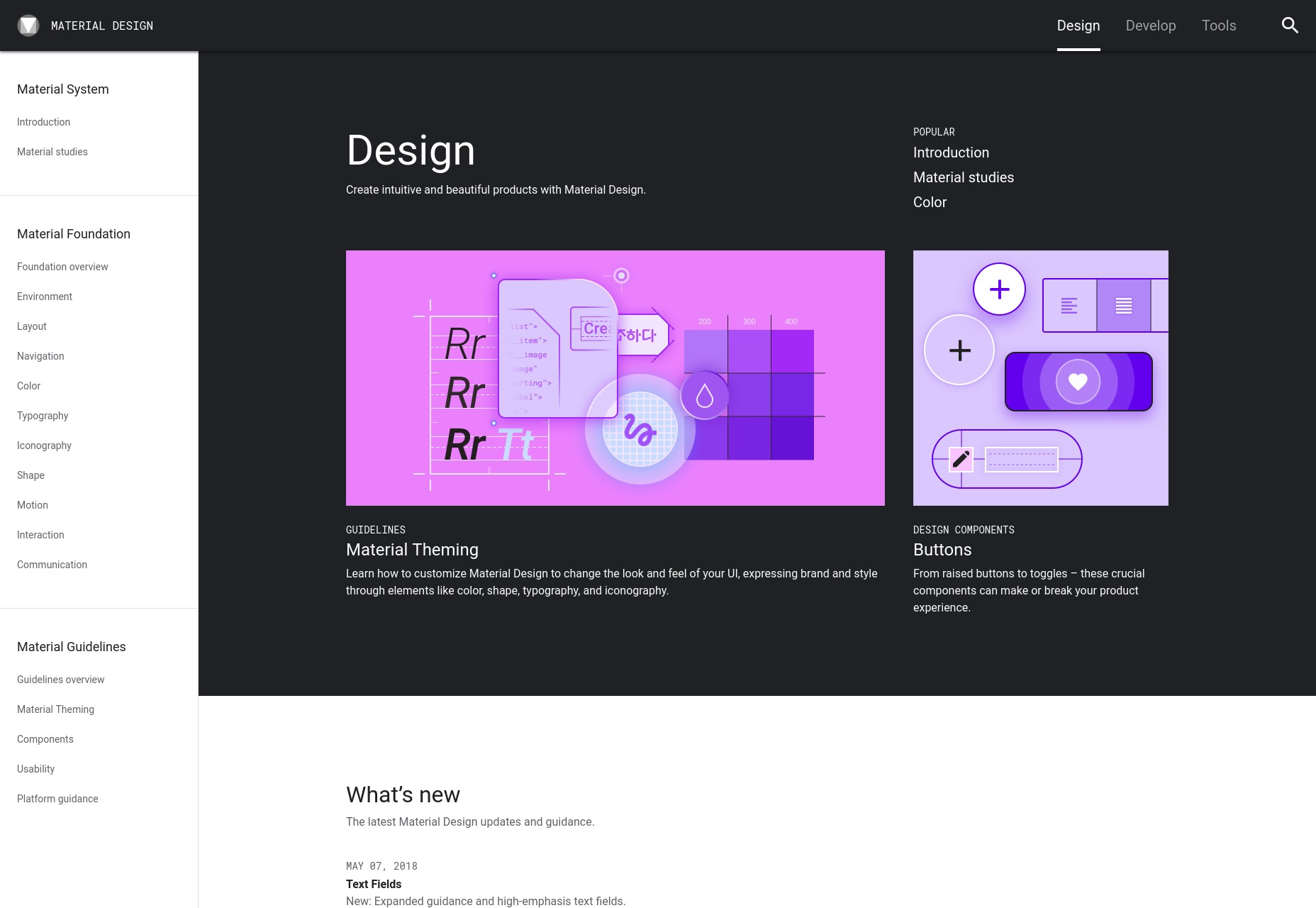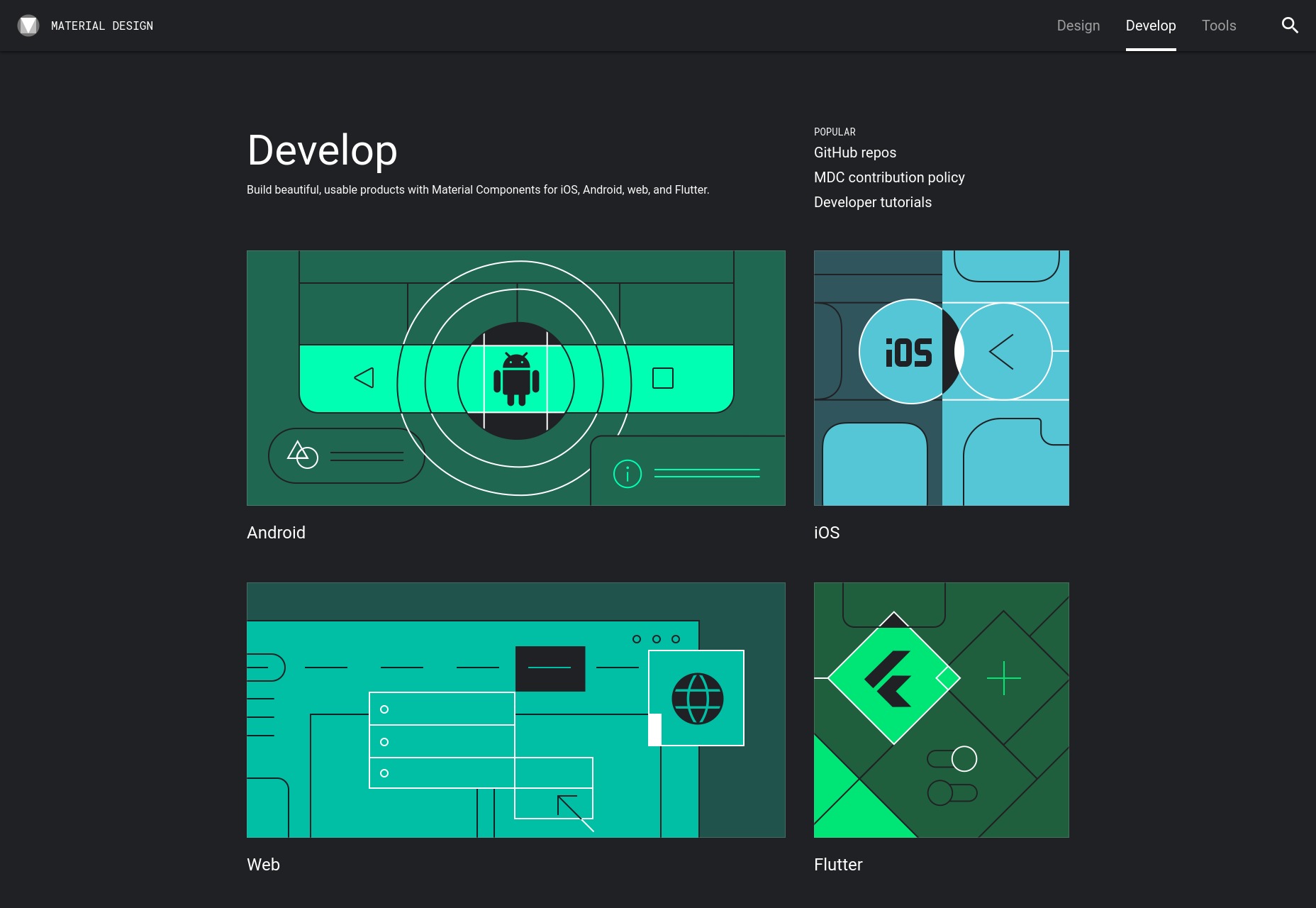
- Design
- Develop
- Tools
Design
This is possibly the meatiest section of the site because it’s where they put all of the theory. It’s a design system first and foremost, after all. The code used to implement it is almost incidental. Here you’ll find an overview of all of the major concepts from Environment, to Shape, to Communication. It gets pretty in-depth. There’s also a pretty large section that deals with the individual UI components of the system, how they’re supposed to be used, etc. There’s also a section full of general guidelines, and a very interesting set of case studies of real apps built using Material Design. If nothing else, go check that out to see all the different ways you can implement one single design system.
Develop
This part of the website is the bit developers (hence the name) will be looking for. It basically just offers code-related documentation for each and every UI component. The cool thing is that you can find the components in four flavors (so far):- Android
- iOS
- Web
- Flutter (Google’s own cross-platform mobile app SDK)

Tools
Lastly, we have a small but useful (and presumably growing) collection of tools.Material theme editor
This one is interesting: It’s a Sketch plugin that’s designed to help you quickly and easily make global changes to your implementation of Material Design. Basically, it’s there to help you implement your own branding with the system. Sketch users will no doubt love this.Icons
This is just what it says on the tin: a massive set of icons to use in your apps. They come in five aesthetic flavors, too. Well, they’re all monochrome, but if you implement them with the provided icon font, or download them as SVGs, you can quickly change that through CSS whenever needed.Color tool
Basically, it’s just a color palette generator, but it’s specifically designed for Material. It gets the job done.Gallery
Last but not least, the gallery is basically Google Drive for stuff built with Material Design. It’s designed to host Sketch files, so you can inspect them. The service itself can link you to relevant developer resources for Material Components, when appropriate. And naturally, you can share your work, and collaborate on projects.In Summary
For anyone looking to dive into Material Design, this is probably one of the most complete resources out there. It will also be the place to look to find information on the system’s newest components, and I have no doubt that they’ll release more tools. If Material is your thing, material.io is exactly where you should be starting.Ezequiel Bruni
Ezequiel Bruni is a web/UX designer, blogger, and aspiring photographer living in Mexico. When he’s not up to his finely-chiselled ears in wire-frames and front-end code, or ranting about the same, he indulges in beer, pizza, fantasy novels, and stand-up comedy.
Read Next
3 Essential Design Trends, November 2024
Touchable texture, distinct grids, and two-column designs are some of the most trending website design elements of…
20 Best New Websites, October 2024
Something we’re seeing more and more of is the ‘customizable’ site. Most often, this means a button to swap between…
Exciting New Tools for Designers, October 2024
We’ve got goodies for designers, developers, SEO-ers, content managers, and those of you who wear multiple hats. And,…
15 Best New Fonts, September 2024
Welcome to our roundup of the best new fonts we’ve found on the web in the previous four weeks. In this month’s edition…
By Simon Sterne
3 Essential Design Trends, October 2024
This article is brought to you by Constantino, a renowned company offering premium and affordable website design
You…
A Beginner’s Guide to Using BlueSky for Business Success
In today’s fast-paced digital world, businesses are always on the lookout for new ways to connect with their audience.…
By Louise North
The Importance of Title Tags: Tips and Tricks to Optimize for SEO
When it comes to on-page SEO, there’s one element that plays a pivotal role in both search engine rankings and user…
By Simon Sterne
20 Best New Websites, September 2024
We have a mixed bag for you with both minimalist and maximalist designs, and single pagers alongside much bigger, but…
Exciting New Tools for Designers, September 2024
This time around we are aiming to simplify life, with some light and fast analytics, an all-in-one productivity…
3 Essential Design Trends, September 2024
September's web design trends have a fun, fall feeling ... and we love it. See what's trending in website design this…
Crafting Personalized Experiences with AI
Picture this: You open Netflix, and it’s like the platform just knows what you’re in the mood for. Or maybe you’re…
By Simon Sterne
15 Best New Fonts, August 2024
Welcome to August’s roundup of the best fonts we’ve found over the last few weeks. 2024’s trend for flowing curves and…
By Ben Moss















